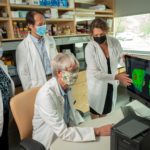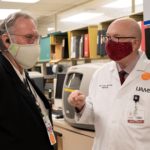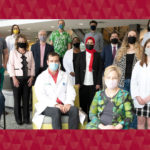November 15, 2021
UAMS Receives $18.9 Million NIH Award to Address Health Disparities

LITTLE ROCK — The University of Arkansas for Medical Sciences (UAMS) has received $18.9 million from the National Institutes of Health (NIH) to support new research and interventions that will focus on reducing cancer and cardiovascular disease disparities among people who live in rural areas and African American populations across Arkansas. The five-year award from…
November 4, 2021
UAMS Receives Full Accreditation, Area of Distinction for its Human Research Protection Program

The University of Arkansas for Medical Sciences (UAMS) Human Research Protection Program was fully accredited recently for another five years by the Association for the Accreditation of Human Research Protection Programs (AAHRPP). UAMS became one of the first 25 institutions in the United States to receive the accreditation in 2005 and has maintained it since…
November 1, 2021
NIH Awards $13.8 Million to Test UAMS-Discovered Drug for Methamphetamine Use Disorder Treatment

A drug discovered at the University of Arkansas for Medical Sciences (UAMS) to counter the effects of methamphetamine will be tested in a phase 2 clinical trial as the only potential treatment of its kind for methamphetamine use disorder.
October 28, 2021
UAMS Researchers See 12% Increase in Grant Funding for FY2021

LITTLE ROCK — The University of Arkansas for Medical Sciences (UAMS) and its affiliate research institutions saw research funding grow by 12.2% this past year, with $177.4 million in grants by the end of the fiscal year on June 30. It is the second consecutive year with double-digit increases in research funding that comes from…
October 26, 2021
NCI Grant Supporting UAMS Research to Improve Cancer Treatment for Patients Lacking Good Gut Bacteria

LITTLE ROCK — A University of Arkansas for Medical Sciences (UAMS) research team will use a National Cancer Institute (NCI) grant to study promising new ways to improve the effectiveness of a common cancer treatment for patients lacking beneficial gut bacteria. The five-year, nearly $2 million grant is led by Ruud P.M. Dings, Ph.D., M.Sc., an…
September 29, 2021
UAMS Research Team Upends Understanding of How Blood Clots Form; NIH Awards $2.5 Million for Further Study

LITTLE ROCK — A UAMS-led research team has found that blood clots form in puncture wounds similar to a skyscraper, with rooms and furnishings that scientists can now see. Published in Communications Biology, the discovery of the vaulted thrombus (blood clot) structure surprised researchers and is a big change from a long-held hypothesis. The Sept….
September 9, 2021
UAMS Research Team Finds Potential Cause of COVID-19 ‘Long-haulers’

LITTLE ROCK — A UAMS research team has identified a potential cause of long-lasting symptoms experienced by COVID-19 patients, often referred to as long-haulers. The findings were published in the journal, The Public Library of Science ONE (PLOS ONE). At the heart of the team’s findings is an antibody that shows up weeks after an…
August 19, 2021
UAMS Researcher Leading $3.1 Million Preschool Intervention to Reduce Obesity and Cancer in Arkansas, Louisiana

UAMS is leading a major new effort to reduce cancer by addressing eating habits in early childcare and education settings. The project, led by UAMS’ Taren Swindle, Ph.D., will reach about 5,000 children and 500 teachers across Arkansas and Louisiana.
July 21, 2021
Cancer Discovery Published in Nature Highlights National Role of UAMS Research Team

LITTLE ROCK — A highly specialized UAMS research team that serves as a national resource recently helped the University of North Carolina (UNC) discover a key driver of cancer cell development. The discovery, which gives researchers around the globe a new target for drug therapies, was published in the journal Nature. The achievement put an…
July 20, 2021
UAMS Releases Findings from Statewide COVID-19 Antibody Study

LITTLE ROCK — A statewide COVID-19 antibody study led by UAMS found that by the end of 2020, 7.4% of Arkansans had antibodies to the virus, but there were wide disparities among racial and ethnic groups. UAMS researchers released their findings this week to a public database, medRxiv (med archive).
Previous page Next page